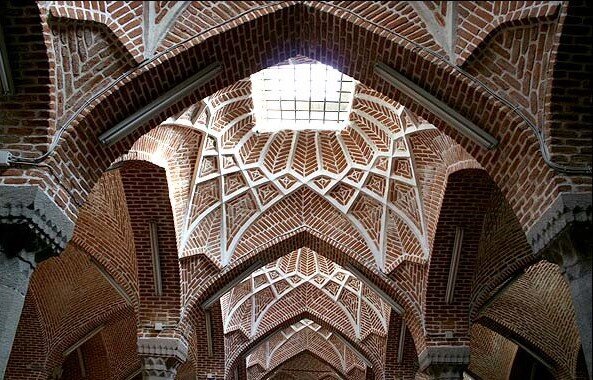TEHRAN –The historical Jameh Mosque of Marand, which stands tall in East Azarbaijan province, northwest Iran, holds the potential to turn into a tourist destination, the deputy provincial tourism chief has said.
The 700-year-old Jameh Mosque of Marand has both historical and touristic significance, IRNA quoted Vahid NAvadad as saying on Wednesday.
Therefore, the religious utilization of the central part of this site will be minimized to focus on tourism and make it more visitor-friendly, the official added.
It is planned to separate the central part of the mosque from the rest of it, making it easily accessible to visitors at any time of the day without any hassle, he noted.
However, the restoration projects, which have recently been begun on the historical structure, need to come to an end, he mentioned.
Jameh Mosque of Marand is estimated to date back to the Ilkhanate times (1256–1335/1353). Hulegu, a grandson of Genghis Khan, was given the task of capturing Iran by the paramount Mongol chieftain Mongke. Hulegu set out in about 1253 with a Mongol army of about 130,000. He founded the Il-Khanid dynasty in 1256, and by 1258 he had captured Baghdad and all of Iran. The Il-Khans consolidated their position in Iran and reunited the region as a political and territorial entity after several centuries of fragmented rule by petty dynasties.
Soaked in history and culture for millennia, Tabriz, which is the capital of East Azarbaijan, embraces several historical and religious sites, including the Jameh Mosque of Tabriz and Arg of Tabriz, and UNESCO-registered Tabriz Historic Bazaar Complex to name a few. The city became the capital of the Mongol Il-Khan Mahmud Gazan (1295–1304) and his successor. Timur (Tamerlane), a Turkic conqueror, took it in 1392. Some decades later the Kara Koyunlu Turkmen made it their capital, it was when the famous Blue Mosque was built in Tabriz.
The city retained its administrative status under the Safavid dynasty until 1548 when Shah Tahmasp I relocated his capital westward to Qazvin. During the next two centuries, Tabriz changed hands several times between Persia and Ottoman Empire. During World War I, the city was temporarily occupied by Turkish and then Soviet troops.


No comments:
Post a Comment